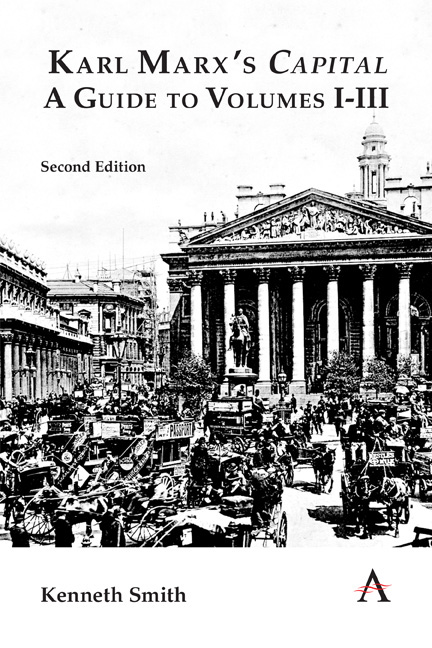Book contents
- Frontmatter
- Dedication
- Contents
- Preface to the Second Edition
- Introduction
- Part I The Development of the Capitalist Mode of Production
- Part II The Capitalist Mode of Production
- Part III The Underdevelopment of the Capitalist Mode of Production
- Part IV The Value Theory of Labour
- Conclusion to Part IV
- Conclusion
- Appendix: On Social Classes
- Notes
- Bibliography
- Index
9 - The Precipitation of Fixed Capital in Capital, Vol. II, Ch. 21, Sections 1–2; Ch. 20, Section 11
Published online by Cambridge University Press: 17 April 2021
- Frontmatter
- Dedication
- Contents
- Preface to the Second Edition
- Introduction
- Part I The Development of the Capitalist Mode of Production
- Part II The Capitalist Mode of Production
- Part III The Underdevelopment of the Capitalist Mode of Production
- Part IV The Value Theory of Labour
- Conclusion to Part IV
- Conclusion
- Appendix: On Social Classes
- Notes
- Bibliography
- Index
Summary
At this stage, and taking into account the highly abstract nature of Marx's discussion of reproduction and accumulation in Capital, Vol. II, it may seem that we do not know very much more about the material conditions which are said to compel capitalist accumulation than we already knew following Marx's discussion of this in Vol. I. However, I want to suggest that this is not the case and that, in point of fact, we actually do know quite a bit more than we did before, of which the following may be said to be the most important points:
(i) There must be an equilibrium between the supply and demand of DI and DII for means of production and means of consumption if simple reproduction is to take place.
(ii) There must nevertheless be a disequilibrium of some kind within the system of production if reproduction on an extended scale is to take place.
(iii) Simple reproduction is always a part (and Marx says the most important part at that) of all annual reproduction on an extended scale.
(iv) That therefore, the disequilibrium necessary for reproduction on an extended scale to take place must always be brought back into equilibrium before simple reproduction on an extended scale can take place.
(v) That this disequilibrium cannot simply be of such a kind as to create an over-production in society since, where this is the case, there would seem to be no reason why this over-production cannot simply be wasted if, by definition, it is surplus to the requirements of simple reproduction.
(vi) That, on the other hand, this disequilibrium cannot be of such a kind as to be brought about by a shortfall in production since in this case not even simple reproduction will take place.
(vii) That there must nevertheless be a surplus of some kind on the material basis of which the scale of the process of production can be extended, since otherwise reproduction on a extending scale would never take place.
(viii) That it seems somehow unsatisfactory to suggest that this surplus can be achieved by the capitalists of either DI or DII reducing their consumption of articles of luxury when there does nor seem to be any motive for them to do this.
- Type
- Chapter
- Information
- Karl Marx's 'Capital': A Guide to Volumes I-III , pp. 69 - 78Publisher: Anthem PressPrint publication year: 2021



